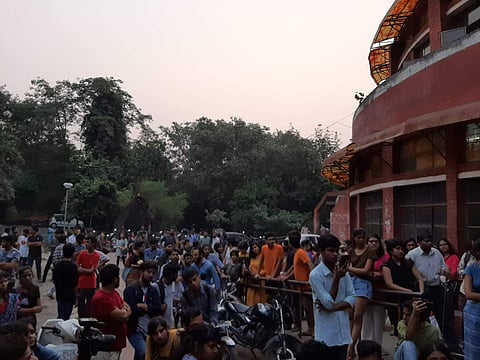

The students of Jawaharlal Nehru University will continue their sit-in at the JNU Students' Union room and have resolved not to let the administration lock the room that they see as one of the very few spaces on campus that allow free and democratic dialogue and debate. The students will address the media at 2 pm.
Former JNUSU President N Sai Balaji said that they will continue the sit-in and will convene activities in front of the union room. "We will be sleeping, holding classes, movie screenings, cultural programmes and many others right here," said the former Prez. "We won't let democracy fall. We won't let JNU admin destroy JNUSU," he added. More than 500 students who have resolved to continue the sit-in planned a movie night outside the Union room on October 16. The much-debated film, Ram Ke Naam, was screened after dinner.
The JNU administration was supposed to 'double' lock up the JNU Student Union office room. A room that hasn't been shut ever since it the first JNUSU was elected. The Dean of Students Affairs, Umesh Kadam, issued a notice saying that the room would be locked since this year's and last year's JNUSU has not yet been notified, according to him. But the officials who went to lock the room were met with resistance from the students.
The students did not let varsity officials lock the Students' Union room as they stood their ground and dared the security personnel to 'step on them' to get to the door. Balaji said that the security personnel knew that the students won't let them lock the door. "They knew before they came here that we won't allow this to happen," he said. "We told them that they have to step on us to reach the door. They were not ready to do that and left," he added.
Students on campus say that the office is one of the very few spaces on campus that remained for democratic dialogue and debate. The JNUSU believes that locking it is one of the several steps that the administration has taken to 'shun voices on campus'. In the notice, the administration had said that the Lyngdoh Committee Recommendations had been violated which is why the current and previous JNUSU had not been notified. Balaji calls the notice itself completely illegal. "If there was any violation that was made then the Grievance Redressal Committee should be the one saying so, not the Dean of Students," he explained.
The current JNUSU President, Aishe Ghosh said that they will be protesting today and will continue the sit-in till the notice is withdrawn by the administration. "The administration has absolutely no right to shut down the office. If they don't withdraw the notice, then we will take it forward legally but we will not budge from here either," she said. Ghosh says that since several spaces on campus that were usually used for debate, dialogue and meetings have been restricted from usage, the students were heavily dependent on the office for their activities.
The room is used for a range of activities from JNUSU meeting, oath-taking ceremonies, student party meetings and any student-related event, Ghosh said. Balaji added that for the student population, the room symbolises democracy. "It is not just a place where we held meetings but it was a place where we celebrated democracy. Everyone from students, teachers, contract workers, sanitary workers have been in that room and showed resistance to anti-people policies from time to time," Balaji said.
Balaji says that by shutting down the room, the administration wants to rewrite history, "Previously, we would meet at the mess, dhabas and other spaces which are all now places that have been restricted to us. So now the only place to meet was the office and so they want to shut down that too. They want to just criminalise every space on campus," he feels.
Any problem should have been discussed democratically, first, he said. "If someone had violated the rules then that person should have first been notified and then called for an inquiry. An investigation should have been conducted and then the GRC would have had to announce its verdict. None of that happened, so the Dean of Students has no right to issue such a circular, which is why it's illegal," he added.
He also said that firstly, the Delhi High Court had passed orders allowing the JNUSU representatives to participate in all important decision-making meetings. "Secondly, in the case filed in court regarding the JNUSU results, the court had clearly stated that if the LCR had been violated then it was the GRC that had to hold an investigation and ordered the Election Committee to announce the results. And that is what happened," the former JNUSU President said.
